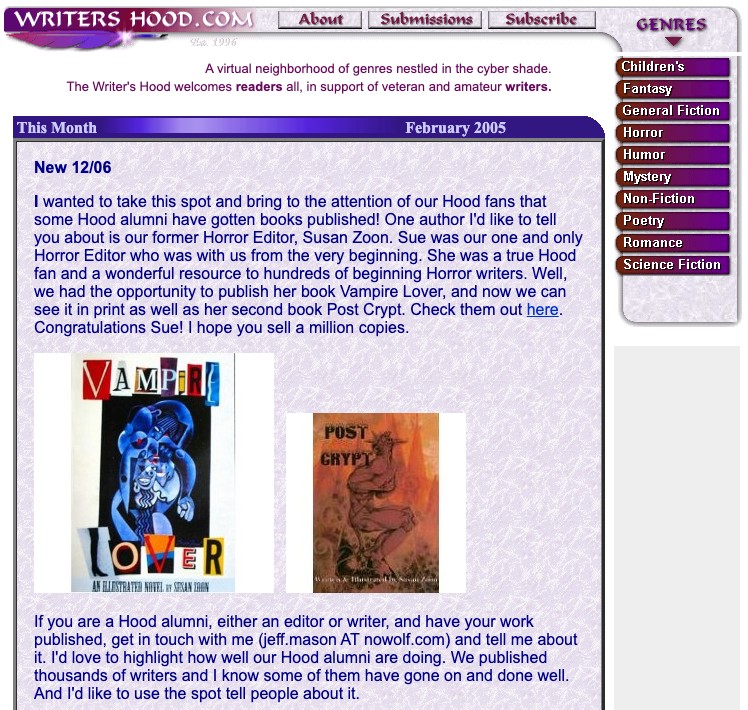The Writer’s Hood Review: A Cherished Digital Literary Community We Still Miss
Rating: ⭐⭐⭐⭐⭐ (5/5 Stars)
Reviewed by the RealReviews.net Family Team
As a family passionate about writing and supporting emerging literary talent through RealReviews.net, we have fond memories of The Writer’s Hood (writershood.com), a groundbreaking online literary magazine that operated from 1996 to 2004. Though the site has been closed for nearly two decades, its impact on the digital writing community remains significant enough to warrant this retrospective review.

A Pioneer in Online Literary Publishing
The Writer’s Hood was truly ahead of its time, establishing itself as “a virtual neighborhood of genres nestled in the cyber shade” when online publishing was still in its infancy. Originally founded as “The Little Read Writer’s Hood” by Jeff Mason and Brian Lee, the magazine earned an official Library of Congress ISSN (1526-1433), demonstrating its legitimacy as a serious literary publication.
The platform served as both a publishing venue and a supportive community for writers at all levels, from complete beginners to established veterans. This inclusive approach created something special – a digital space where emerging writers could develop their craft alongside experienced authors, fostering mentorship and growth that was rare in the literary world.
Our Family’s Experience with The Hood
Our children and I had the privilege of submitting articles to The Writer’s Hood during its active years, and the experience was consistently positive and encouraging. The editorial staff demonstrated genuine commitment to helping writers improve, providing constructive feedback that went beyond simple acceptance or rejection letters.
What impressed us most was the magazine’s dedication to nurturing new talent. Unlike many publications that seemed focused primarily on established writers, The Writer’s Hood actively sought out and developed emerging voices. The editors understood that every accomplished writer was once a beginner, and they treated submissions accordingly – with respect, patience, and genuine interest in helping writers grow.

Editorial Excellence Across Multiple Genres
The Writer’s Hood covered twelve different genres, each overseen by dedicated editors who brought expertise and passion to their roles. These editors weren’t just gatekeepers; they were mentors who worked closely with writers to refine their submissions and develop their skills.
The magazine’s Horror section, led by Susan Zoon, exemplified this approach. Susan served as the publication’s only Horror Editor throughout its run, becoming a trusted resource for hundreds of beginning horror writers. Her dedication paid off – she went on to publish her own novels, including “Vampire Lover” and “Post Crypt,” demonstrating the caliber of talent The Hood attracted as staff.
The fact that editors needed associate editors to handle the volume of submissions speaks to the magazine’s success in attracting writers and building a vibrant literary community. This growth reflected the quality of both the publication and the support system it provided.
Building a True Literary Community
Beyond publishing, The Writer’s Hood fostered genuine community through message boards and interactive features that allowed writers and readers to connect directly. This community aspect set it apart from traditional print magazines and established a model that many subsequent online publications would attempt to replicate.
The magazine’s commitment to its community extended to celebrating alumni success. The founders actively tracked and promoted former contributors who went on to publishing success, demonstrating ongoing investment in writers’ careers long after their work appeared in The Hood.
The Challenges of Digital Publishing
The Writer’s Hood’s closure in 2004 illustrated the challenges facing early digital publications. The magazine struggled with hosting companies going out of business and the constant need to upgrade technology systems. These technical challenges, combined with the founders’ commitment to operating as a labor of love rather than a profit-driven enterprise, ultimately made continuation unsustainable.
The founders’ final message revealed both the personal investment they had made in the project and their genuine sadness at having to close. Their offer to sell the entire operation – domain, graphics, and all content – to someone who would continue the mission demonstrated their hope that The Hood’s work might continue under new leadership.

Lasting Impact on Digital Literature
From our RealReviews.net perspective, The Writer’s Hood helped establish many conventions that remain standard in online literary publishing today. The combination of editorial mentorship, community building, and inclusive submissions policies created a template that influenced countless subsequent publications.
The magazine’s success in launching writers’ careers – with some alumni going on to make their living as writers – validates its approach and mission. The founders’ claim that they “kicked off the careers of writers who now make their living writing” reflects real impact on the literary landscape.
What Made The Hood Special
Several factors distinguished The Writer’s Hood from other literary magazines of its era. The genuine commitment to writer development, the inclusive approach to submissions, the active community building, and the professional standards (evidenced by the Library of Congress ISSN) combined to create something truly valuable.
The personal touch was crucial – editors who remembered individual writers, provided ongoing support, and maintained relationships that extended beyond publication decisions. This human element transformed what could have been merely a submission portal into a genuine literary community.

Why We Still Hope for Its Return
Nearly two decades after The Writer’s Hood closed, our family still hopes it might return someday. The digital publishing landscape has evolved dramatically, potentially making the technical challenges that forced its closure more manageable today.
The magazine’s mission – encouraging novice writers while publishing work from beginners and veterans alike – remains as relevant now as it was in the 1990s and early 2000s. If anything, the explosion of online content has made the need for quality editorial guidance and supportive literary community even more critical.
Final Thoughts from RealReviews.net
The Writer’s Hood represents what digital literary publishing can achieve when guided by genuine passion for supporting writers and building community. While we mourn its closure, we celebrate its eight-year contribution to literature and its lasting influence on online publishing.
For families like ours who value literary development and community engagement, The Writer’s Hood set a standard that few publications have matched. It proved that online magazines could be more than simple content repositories – they could be genuine communities that nurture talent and foster lasting connections.
Our hope remains that someone will revive The Hood’s mission, bringing back its unique combination of editorial excellence, community support, and inclusive publishing philosophy. The digital world needs more publications that prioritize writer development alongside quality content, and The Writer’s Hood’s legacy continues to inspire those efforts.

Note: The Writer’s Hood operated from 1996-2004 at writershood.com with Library of Congress ISSN 1526-1433. While the original site is no longer active, its influence on digital literary publishing continues to be felt across the online writing community.

